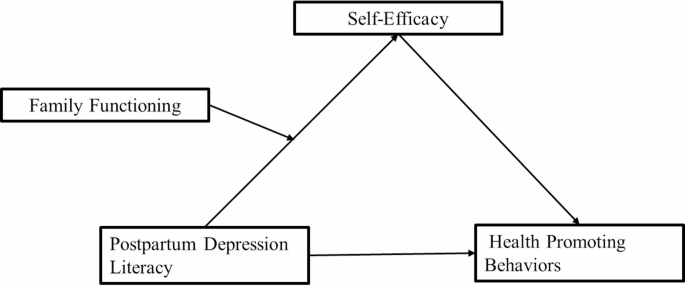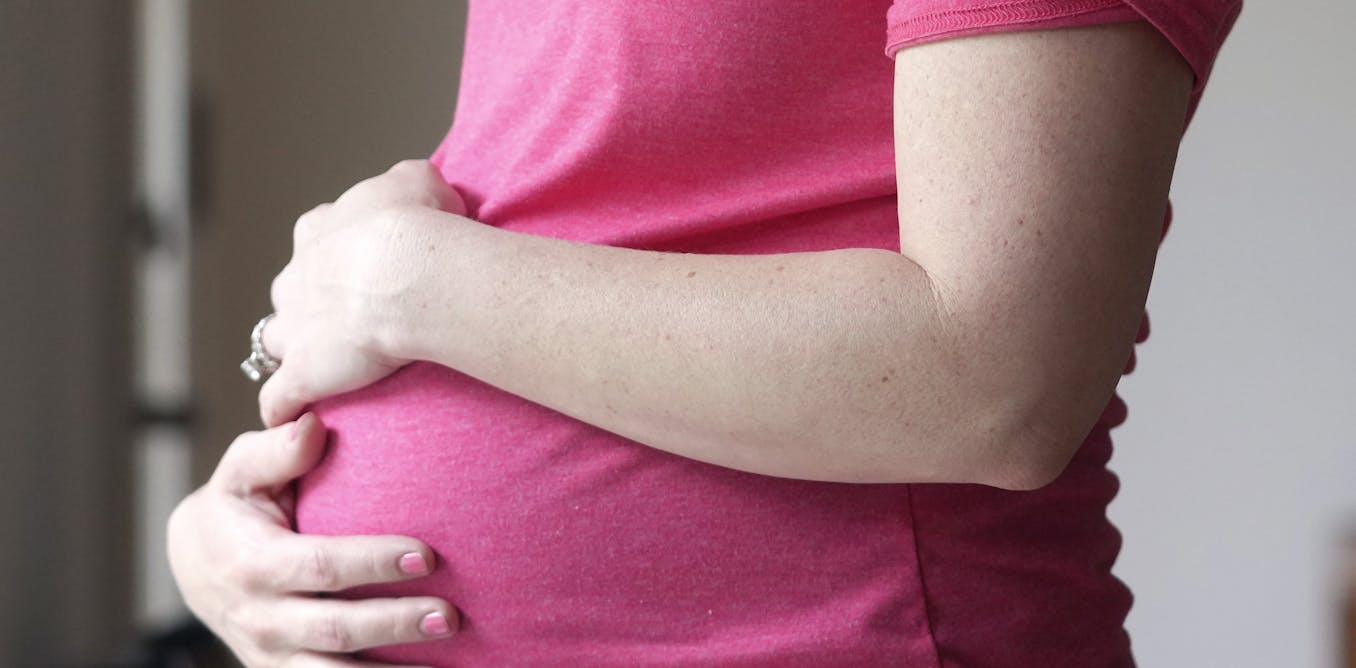The influence of postpartum depression literacy on health promoting behaviors among postpartum women

American College of Obstetricians and Gynecologists. Physical activity and exercise during pregnancy and the postpartum period: ACOG committee opinion, number 804. Obstet. Gynecol. 135 (4), e178–e188 (2020).
Google Scholar
Kazemi, A. F. & Hajian, S. Experiences related to health promotion behaviors in overweight pregnant women: a qualitative study. Reprod. Health. 15 (1), 219 (2018).
Google Scholar
Mirghafourvand, M. et al. A population-based study of health-promoting behaviors and their predictors in Iranian women of reproductive age. Health Promot Int. 30 (3), 586–594 (2015).
Google Scholar
Zheng, H. A study on the correlation between health-promoting behaviors, family function, and psychological consistency in older multiparous women (2018).
Bogaerts, A. F. et al. Effects of lifestyle intervention in obese pregnant women on gestational weight gain and mental health: a randomized controlled trial. Int. J. Obes. (Lond). 37 (6), 814–821 (2013).
Google Scholar
Ferrara, A. et al. A telehealth lifestyle intervention to reduce excess gestational weight gain in pregnant women with overweight or obesity (GLOW): a randomized, parallel-group, controlled trial. Lancet Diabetes Endocrinol. 8 (6), 490–500 (2020).
Google Scholar
Oteng-Ntim, E. et al. Lifestyle interventions for overweight and obese pregnant women to improve pregnancy outcome: systematic review and meta-analysis. BMC Med. 10, 47 (2012).
Google Scholar
Procter, S. B. & Campbell, C. G. Position of the academy of nutrition and dietetics: nutrition and lifestyle for a healthy pregnancy outcome. J. Acad. Nutr. Diet. 114 (7), 1099–1103 (2014).
Google Scholar
Reijnders, I. F. et al. The impact of periconceptional maternal lifestyle on clinical features and biomarkers of placental development and function: a systematic review. Hum. Reprod. Update. 25 (1), 72–94 (2019).
Google Scholar
Jalili Bahabadi, F. et al. Predictors of health-promoting lifestyle in pregnant women based on pender’s health promotion model. Int. J. Womens Health. 12, 71–77 (2020).
Google Scholar
Xie, X. Obstetrics and Gynecology 223 (People’s Medical Publishing House, 2018).
Norhayati, M. N. et al. Magnitude and risk factors for postpartum symptoms: a literature review. J. Affect. Disord. 175, 34–52 (2015).
Google Scholar
Edmond, K. M. The importance of interventions to improve maternal mental health. J. Trop. Pediatr. 63 (1), 1–9 (2017).
Google Scholar
World Health Organization. Regional Office for Europe. Health Literacy: the Solid Facts (WHO, 2013).
Mirsalimi, F. et al. The postpartum depression literacy scale (PoDLiS): development and psychometric properties. BMC Pregnancy Childbirth. 20 (1), 13 (2020).
Google Scholar
Jimenez, D. E., Thomas, L. & Bartels, S. J. The role of serious mental illness in motivation, participation and adoption of health behavior change among obese/sedentary Latino adults. Ethn. Health. 24 (8), 889–896 (2019).
Google Scholar
Guy, S. et al. Mental health literacy and postpartum depression: a qualitative description of views of lower income women. Arch. Psychiatr Nurs. 28 (4), 256–262 (2014).
Google Scholar
Nishida-Hikiji, E. et al. Mental health literacy regarding eating disorders in female Japanese university students. Eat. Disord. 29 (1), 17–28 (2021).
Google Scholar
Jiang, G. et al. The current status and characteristics of National mental health literacy in China. Psychol. Acta. 53 (2), 182–201 (2021).
Google Scholar
Eller, L. S. et al. Describing self-care self-efficacy: definition, measurement, outcomes, and implications. Int. J. Nurs. Knowl. 29 (1), 38–48 (2018).
Google Scholar
Cha, J. et al. The factors associated with health promotion behavior of international students in South Korea. Iran. J. Public. Health. 51 (1), 56–66 (2022).
Google Scholar
Hamed Bieyabanie, M. & Mirghafourvand, M. Health promoting lifestyle and its relationship with self-efficacy in Iranian mastectomized women. Asian Pac. J. Cancer Prev. 21 (6), 1667–1672 (2020).
Google Scholar
Chen, N., Zhang, J. & Wang, Z. Effects of middle-aged and elderly people’s self-efficacy on health promotion behaviors: mediating effects of sports participation. Front. Psychol. 13, 889063 (2023).
Google Scholar
Almanasef, M. Mental health literacy and help-seeking behaviours among undergraduate pharmacy students in abha, Saudi Arabia. Risk Manag Healthc. Policy. 14, 1281–1286 (2021).
Google Scholar
Baheiraei, A. et al. Facilitators and inhibitors of health-promoting behaviors: the experience of Iranian women of reproductive age. Int. J. Prev. Med. 4 (8), 929–939 (2013).
Google Scholar
Charoghchian Khorasani, E. et al. Health literacy in Iranian women: a systematic review and meta-analysis. Iran. J. Public. Health. 49 (5), 860–874 (2020).
Google Scholar
Li, S. H. The Relationship between Adolescent Mental Health Literacy, self-efficacy, and non-suicidal self-injury: an Intervention Study (Hubei Normal University, 2023).
Lustman, P. J., Penckofer, S. M. & Clouse, R. E. Recent advances in Understanding depression in adults with diabetes. Curr. Diab Rep. 7 (2), 114–122 (2007).
Google Scholar
Zheng, H. A study on the relationship between health-promoting behaviors, family function, and psychological consistency in older multiparous women. Nurs. Manage. J. 20 (1), 1–6 (2020).
Google Scholar
Iwanowicz-Palus, G. et al. The relationship between social support, self-efficacy and characteristics of women with diabetes during pregnancy. Int. J. Environ. Res. Public. Health. 19 (1), 304 (2021).
Google Scholar
Jiang, W. L. et al. A qualitative study on the causes of health-promoting behaviors in pregnant women with gestational diabetes. Nurs. J. 35 (12), 20–22 (2020).
Pender, N. J., Murdaush, L. & Darsom, M. Health Promotion in Nursing Practice 5th edn 37 (Pearson Prentice Hall, 2006).
Huang, W. J. Research on the Construction of Psychological Health Literacy Intervention Programs Related To Postpartum Depression in Mothers (China Medical University, 2022).
Walker, S. N., Sechrist, K. R. & Pender, N. J. The health-promoting lifestyle profile: development and psychometric characteristics. Nurs. Res. 36 (2), 76–81 (1987).
Google Scholar
Schwarzer, R. The assessment of optimistic self-beliefs: comparison of the german, spanish, and Chinese versions of the general Self-efficacy scale. Psychologia 42 (5), 69–88 (1997).
Wang, C. K., Hu, Z. F. & Liu, Y. Reliability and validity study of the general Self-Efficacy scale. Appl. Psychol. 1, 37–40 (2001).
Olson, D. H., Russell, C. S. & Sprenkle, D. H. Circumplex model of marital and family systems: VI. Theoretical update. Fam Process. 22 (1), 69–83 (1983).
Google Scholar
Fei, L. P. et al. Preliminary evaluation of the family intimacy and adaptability scale and the family environment scale: a comparative study of normal families and family members with schizophrenia. Chin. J. Mental Health. 5 (5), 198–202 (1991).
Gaupšienė, A. et al. Associations between maternal health literacy, neonatal health and breastfeeding outcomes in the early postpartum period. Eur. J. Midwifery. 7, 25 (2023).
Google Scholar
Poreddi, V. et al. Postpartum depression: mental health literacy of Indian mothers. Arch. Psychiatr Nurs. 35 (6), 631–637 (2021).
Google Scholar
Astantekin, F. O., Erkal, Y. A. & Sema, Y. D. The effects and related factors of health literacy status and self-efficacy of pregnant women. Int. J. Caring Sci. 12, 1815 (2019).
Chen, S. Y. et al. The relationship between community exercise health service quality and health-promoting behaviors among older adults: the mediating role of self-efficacy. Chin. J. Health Psychol. 32 (11), 1608–1614 (2024).
Du, S. et al. The role of self-efficacy and self-care agency as mediating factors in the link between health literacy and health-promoting lifestyle among older adults post COVID-19 era: a multiple mediator model. Geriatr. Nurs. 54, 252–257 (2023).
Google Scholar
Beasley, K., Kiser, M. & Hoffman, J. Mental health literacy, self-efficacy, and stigma among college students. Soc. Work Ment Health (2020).
Huang, L. et al. Socioecological influencers of health-promoting lifestyles in chinese: a preliminary survey using convenient samples. Front. Public. Health. 11, 1309824 (2024).
Google Scholar
Wang, X. et al. Exploring the relationship between self-management behaviour, family function and health information adoption behaviour in Chinese diabetic foot patients: a mixed-methods study protocol. BMJ Open. 13 (8), e074739 (2023).
Google Scholar
Thornton, P. L. et al. Weight, diet, and physical activity-related beliefs and practices among pregnant and postpartum Latino women: the role of social support. Matern Child. Health J. 10 (1), 95–104 (2006).
Google Scholar
Yang, L. Q. et al. Analysis of pregnancy stress and its influencing factors among women with a second child. Chin. J. Public. Health. 33 (6), 1000–1003 (2017).
Racine, N. et al. Dynamic and bidirectional associations between maternal stress, anxiety, and social support: the critical role of partner and family support. J. Affect. Disord. 252, 19–24 (2019).
Google Scholar
Lundberg, C. A., McIntire, D. D. & Creasman, C. T. Sources of social support and self-efficacy for adult students. J. Coll. Couns. 11 (1), 58–73 (2008).
Google Scholar
link







